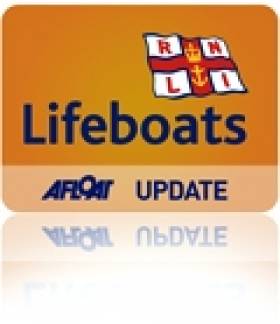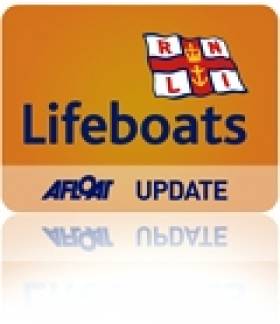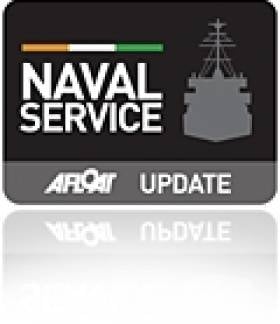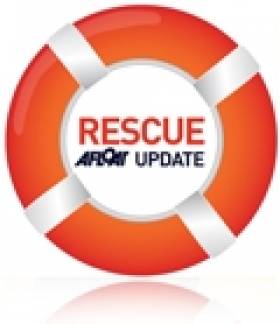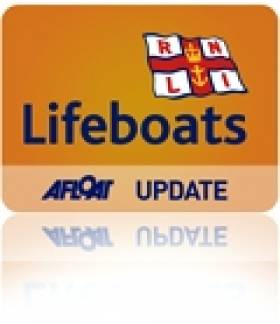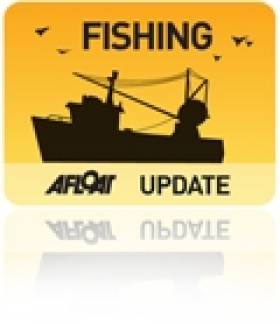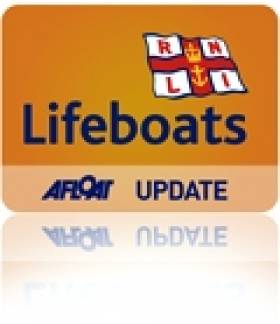Displaying items by tag: castletownbere
Castletownbere Lifeboat Assists Grounded Spanish Trawler
#rnli – Castletownbere lifeboat crew responded to an early morning callout on Saturday when they launched at 5am to reports that a Spanish fishing trawler had grounded at Ard na Kinna on the western point of Bere Island in Cork. The 33 metre vessel had eleven crewmembers onboard.
The Castletownbere lifeboat under Coxswain Brian O'Driscoll pulled up alongside the grounded vessel and assisted some of the crew onboard the lifeboat. Images taken from the RNLI lifeboat camera show the transfer and the crew were safely evacuated. They had not sustained any injuries during the incident.
Commenting on the callout Paul Stevens Castletownbere RNLI lifeboat press officer said, "None of the crew were in any immediate danger but for their own safety we evacuated them from the grounded vessel. They are very fortunate that they sustained no injuries and that conditions were excellent at the time of the grounding."
The vessel was successfully refloated at 4pm yesterday.
Father Dies Following Capsize in Enterprise Sailing Dinghy
#rnli – There was a tragic end to an afternoon sail for a father and son in an Enterprise sailing dinghy in West Cork yesterday. As reported earlier on Afloat.ie the Castletownbere lifeboat was launched shortly after 9.30pm on Monday night to search for a man who was reported by his son to be clinging to an upturned boat. The son had managed to make his way ashore after spending four hours clinging to the boat with his father.
Castletownbere RNLI was involved in the subsequent search and recovery for the man in the early hours of this morning (Tuesday). A search at sea and along the shore continued all last evening in good weather conditions and at about ten past one in the morning, the casualty was spotted by a helicopter in a place known locally as Cod's Head. He was recovered by the Derrynane inshore boat to the Castletownbere lifeboat and brought to Castletownbere.
Sadly the man did not survive his ordeal and Lifeboat spokesman Paul Stevensl extended his sympathy on behalf of Castletownbere RNLI to the family of the deceased who has been named locally as John O'Leary from Allihies.
Early yesterday evening it is understood that the father and his teenage son went sailing in a small dingy off Allihies in West Cork and shortly after that the boat capsized. Both hung on to the upturned craft for approximately four hours where upon the teenage son made his way ashore and raised the alarm.
Stevens said the whole Beara Pennisula would be shocked by the loss: 'The Beara Pennisula is waking up this morning with a huge sense of shock. It's no stranger to this sort of tragedy sadly. However, every time an incident like this occurs, of course it has great impact on many people in what is really a very small tight knit community. Moreover, this week is festival week in the village of Allihes where John was from, so this sad tragedy will in the midst of the people of Allihes have changed the mood locally to one of great sadness and great sense of loss'.
Busy Patrol Vessel Detains Second Trawler
#NAVAL SERVICE – Within a space of seven days the Naval Service OPV L.E. Roisin (P51) detained two foreign registered fishing vessels for alleged breaches of fishing regulations.
The most recent detainment was on Tuesday where a UK registered trawler was approximately 33 nautical miles off Mizen Head, Co. Kerry. The detained vessel was escorted to Castletownbere and handed over to the Gardai.
As previously reported on Afloat.ie the other detention took place last week where a Spanish fishing vessel was 150 miles south-west off Co. Clare. and likewise the trawler was escorted to Castletownbere.
To date the Naval Service have carried out 426 boardings, issued 17 warnings and detained four vessels so far in 2012. The navy last year carried out 1,313 boardings and eight detentions of vessels off the Irish Coast.
Massive Fee Increases Proposed for Harbour Yacht Berths
#IRISH HARBOURS - Yachts berthing at Ireland's main fishing harbours could see their charges hiked by an incredible 800 per cent.
According to The Irish Times, Marine Minister Simon Coveney has announced a mere 21 days for comment and consultation on the draft Fishery Harbour Centres (Rates and Charges) Order 2012. The consultation document is attached to the bottom of this post and available to download as a pdf.
The proposed new charges include an annual fee of €250 per metre for yachts, which could see a 10-metre yacht currently paying €312 a year for a berth shell out as much as €2,500 annually for the same space.
Additional water and electricity costs could even see this bill rise to €3,100 - for berths that come "without proper marina facilities in most cases".
The proposals apply to the State's six fishery centres at Killybegs, Rossaveal, Dingle, Castletownbere, Dunmore East and Howth, only two of which have pontoons suitable for leisure boats.
The Irish Times has more on the story HERE.
Air Corps Patrol Assists in Rescue of Injured Fisherman
#RESCUE - The Irish Times reports that an Air Corps maritime patrol aircraft joined a search and rescue mission to evacuate a fisherman off the West Cork coast today.
The Casa CN 235 - one of two operated by the Air Corps - diverted from its daily patrol to provide a communications relay in the operation to rescue an injured crewman from a Spanish fishing boat some 100 miles south of of Castletownbere.
The fisherman was airlifted by an Irish Coast Guard helicopter which at last report was taking him to medical attention in Cork.
Marine Notice on Construction in Castletownbere Harbour
#IRISH HARBOURS - The latest Marine Notice from the Department of Transport, Tourism and Sport (DTTAS) advises on construction works at Castletownbere Fishery Harbour Centre in Co Cork this week.
The works involve the installation of four steel piles - two in the navigation channel to the inner harbour and two to the west of Dinish Pier.
The works are being advanced by civil engineering crews working from a jack-up barge, which will display the relevant day signals and navigation lights in accordance with collision regulations.
For safety reasons, mariners are requested to proceed slowly and with caution in the approach channel to the Fishery Harbour Centre and to give the works a wide berth. Wave-wash from vessels should also be avoided.
These works are expected to be on-going until mid-December, weather permitting.
Complete details for shipowners, ship operations, shipmasters and seafarers are included in Marine Notice No 57 of 2011, a PDF of which is available to read and download HERE.
Castletownbere Lifeboat Rescues Motor Cruiser
Photo Exhibition: People of the Sea / Gens de la Mer
Gilles Perrin selected his subjects by visiting harbours and piers in locations such as Cobh, Baltimore, Castletownbere and Schull. The work was conducted through the Artist in residency programme at Sirius Arts Centre, Cobh and later by a similar residency position at the West Cork Arts Centre which took place over a few months in 2007 & 2008.
People of the Sea is organised in partnership with Veolia Environnement, also the name given for a new MOD70 class (Multi One Design). Veolia Environnement is one of only 12 such high-spec performance yachts which visited Dublin Bay in the summer calling to Dun Laoghaire and a transit of Dalkey Sound (PHOTO's). She was in Irish waters under the skipper Roland Jourdain and crew ahead of her first test, the Fastnet Race held in mid-August. To read more about Veolia Environnement click HERE and also www.canyousea.com/en/
The other participants of the exhibition which have lent their support are the Sirius Arts Centre, The Arts Council, Cork County Council and The West Cork Arts Centre, and iophotoworks. For more information about Perrin who has a master's Degree in photography visit www.art-contemporain.eu.org/perrin/
- Schull
- Baltimore
- Cobh
- castletownbere
- Dublin Bay News
- Dun Laoghaire Harbour
- Fishing News
- Cork County Council
- Sailing news
- Dalkey Sound
- Veolia Environnement
- French Photographer Gilles Perrin
- Gilles Perrin
- People of the Sea/Gens de la Mer
- Alliance Francaise Dublin
- French Cultural Centre Dublin
- Irish Fishing Harbours
- Sirius Arts Centre
- The Arts Council
- West Cork Arts Centre
- The Fastnet Race
- MOD70 class
- Multi One Design
- Irish Fishing Industry
- Roland Jourdain
Fishing Vessel Detained in Cork
The Irish Times reports that the Naval Service detained a Spanish-registered fishing vessel off the Clare coast in the early hours of Tuesday morning.
The vessel was escorted by the LE Niamh to Castletownbere in Co Cork, where it was handed over to gardaí in relation to an alleged breaching of fishing regulations.
No other information is yet known but Afloat.ie will update as details arise.
Body of Fisherman Found in Castletownbere
The body of a fisherman reported missing from a trawler at Castletownbere, Co Cork yesterday morning has been recovered.
Local divers teamed with the Castletownbere Lifeboat and the Irish Coast Guard for a search that ended around 1.30pm when the body of the 43-year-old was found in the water close to the pier.
The Irish Times reports that the man, who resident in Clogherhead, Co Louth, had been socialising with friends the night before and failed to return to the Patrick C, the trawler on which he was a crewman.



























